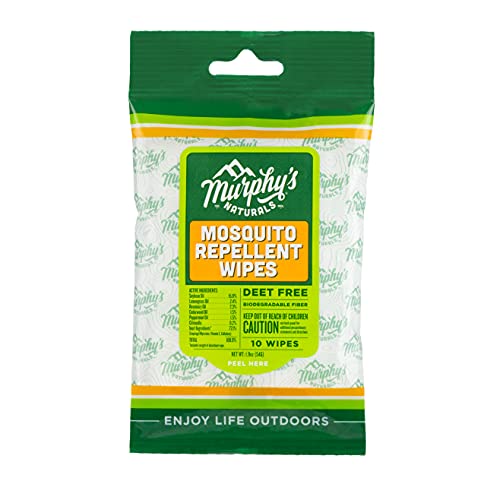
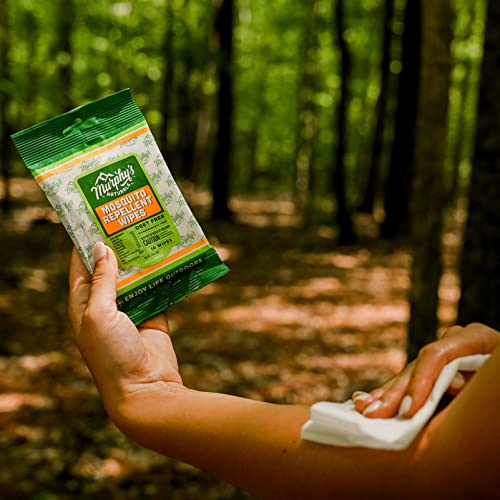
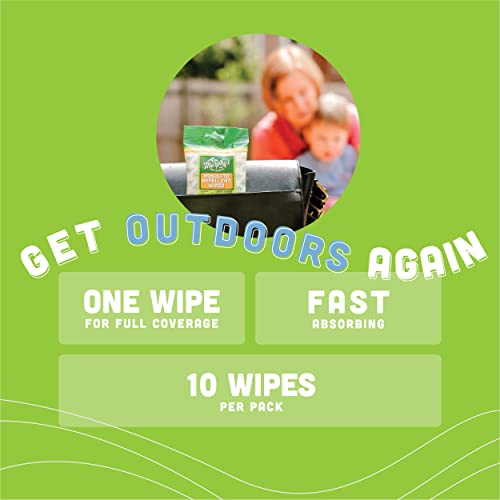
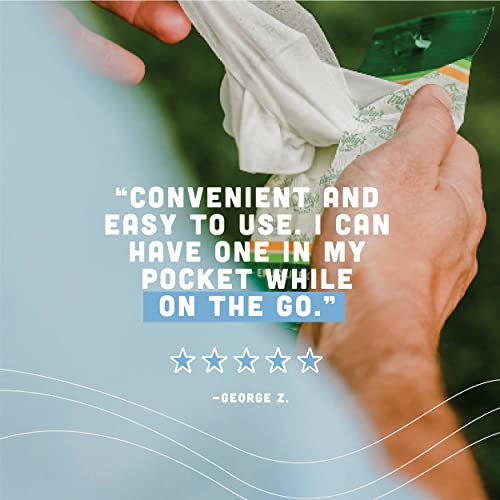
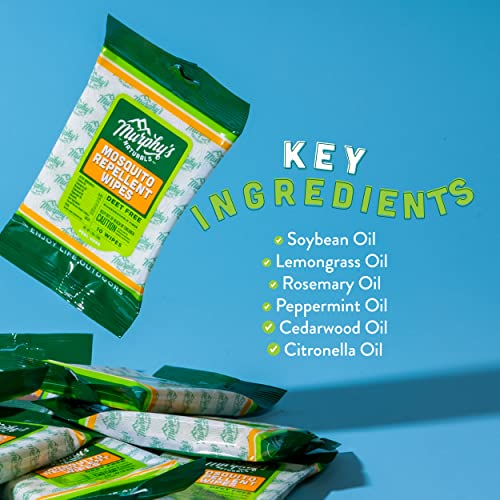


Murphy's Naturals Bug Repellent Wipes - Plant-Based, DEET Free, Travel Size, 10 Wipes


Cymbopogon Schoenanthus Oil
High RiskCymbopogon schoenanthus oil is a volatile oil derived from the leaves of the lemongrass plant, commonly used for its aromatic properties in cosmetics and personal care products. It serves primarily as a fragrance component but may also have antimicrobial properties.
Sustai Insights
Cymbopogon schoenanthus oil offers functional benefits as a fragrance and may contribute antimicrobial properties. However, it has a high allergenic potential, with concerns regarding enhanced skin absorption and potential irritancy. Regulatory bodies have imposed usage restrictions due to these risks. Overall, the ingredient presents a high risk level, necessitating caution in its application, especially for sensitive populations. Alternatives with lower allergenic profiles could be considered in formulation.
Rosmarinus Officinalis (Rosemary) Leaf Oil
Medium RiskRosmarinus officinalis (rosemary) leaf oil is extracted from the leaves of the rosemary plant. It is commonly used in cosmetic and personal care products for its aromatic properties and potential preservative benefits due to its antioxidant content.
Sustai Insights
Rosemary leaf oil offers functional benefits such as antimicrobial and antioxidant properties, which can enhance product stability. It is derived from a renewable source and is biodegradable. However, it presents moderate risks of allergic reactions and skin irritation, particularly with enhanced skin absorption. Regulatory bodies have noted restrictions on its usage in specific concentrations. The overall risk level is assessed as medium. Users are advised to follow safe usage practices and may consider alternatives like tocopherols or other natural preservatives.
Glycine Soja (Soybean) Oil
Low RiskGlycine soja (soybean) oil is derived from the seeds of the soybean plant and is commonly used in cosmetic formulations for its emollient properties. It functions as a moisturizer and skin conditioning agent, enhancing the texture and feel of products.
Sustai Insights
Glycine soja (soybean) oil offers functional benefits such as effective skin moisturization and conditioning. It is generally recognized as low-risk for health concerns, with minimal allergenic potential and no significant environmental hazards reported. Regulatory bodies have not imposed restrictions on its use. Overall, this ingredient is assessed as low risk, making it a suitable option for various cosmetic applications.
Citronella
Low RiskCitronella is an essential oil derived from the leaves and stems of different species of Cymbopogon. It is commonly used as a fragrance in personal care products and as a natural insect repellent due to its distinct scent and properties.
Sustai Insights
Citronella is valued for its effective insect-repelling properties and pleasant fragrance, contributing to its use in various consumer products. It is generally considered safe, with low concerns regarding carcinogenicity, allergies, and reproductive toxicity. However, there are minor potential irritations for sensitive individuals. Environmentally, it poses low risks of pollution and bioaccumulation. Regulatory bodies have not placed significant restrictions on its use. Overall, the ingredient is assessed to have a low risk profile, making it a suitable option in formulations.
Cellulose
Low RiskCellulose is a natural polysaccharide derived from plant cell walls, primarily used as a thickening agent, stabilizer, and emulsifier in cosmetic formulations. It is known for its ability to improve texture and consistency in products.
Sustai Insights
Cellulose serves as an effective thickening and stabilizing agent, enhancing product texture while being biodegradable and derived from renewable sources. Health risks are minimal, with low concerns regarding carcinogenicity, allergies, and reproductive toxicity. Environmental impacts are also low, as cellulose does not contribute significantly to pollution or bioaccumulation. Regulatory agencies have not issued restrictions on its use. Overall, cellulose presents a low risk profile, making it a suitable ingredient choice in cosmetics.
Mentha Piperita (Peppermint) Oil Extract
Low RiskMentha piperita (peppermint) oil extract is derived from the peppermint plant and is commonly used in various products for its aromatic and flavoring properties. It serves multiple functions, including acting as a fragrance agent and providing a cooling sensation in topical applications.
Sustai Insights
Mentha piperita oil offers functional benefits such as flavor enhancement and a refreshing aroma, while it is generally recognized as low risk for health concerns, including carcinogenicity and allergies. Environmentally, it does not contribute significantly to pollution or bioaccumulation. Regulatory bodies do not impose restrictions on its use. Safe usage practices include avoiding excessive exposure, particularly for sensitive individuals. Alternatives like spearmint oil may be considered, but overall, this ingredient is assessed as low risk.
Cedarwood Oil
Low RiskCedarwood oil is an essential oil derived from cedar trees, primarily used for its aromatic properties and as a natural ingredient in personal care products. It serves various functions, including acting as a fragrance, a potential preservative, and an insect repellent.
Sustai Insights
Cedarwood oil offers functional benefits, such as providing a pleasant scent and potential preservation properties due to its antimicrobial effects. It is sustainably sourced and biodegradable. Health-wise, it has low concerns regarding carcinogenicity, allergies, and reproductive toxicity. Environmentally, it poses low risks as a pollutant and is not bioaccumulative. Regulatory bodies have not issued significant warnings, confirming its low-risk status. Safe usage practices should be followed, and alternatives include plant-based essential oils with similar benefits. Overall, cedarwood oil is assessed with a low risk level.
Isopropyl Myristate
Low RiskIsopropyl myristate is composed of isopropyl alcohol and myristic acid. It functions primarily as an emollient, solvent, and skin penetration enhancer in cosmetic formulations. This ingredient is commonly found in creams, lotions, and other topical products to improve texture and absorption.
Sustai Insights
Isopropyl myristate offers functional benefits as an emollient and solvent, enhancing the texture and absorption of products. It is generally recognized as having low health risks, with no significant concerns regarding carcinogenicity, allergies, or reproductive toxicity. Environmentally, it poses minimal risks, not being classified as a pollutant or bioaccumulative. Regulatory bodies have not imposed significant restrictions, supporting its safe use in cosmetics. Overall, the risk level associated with isopropyl myristate is low, making it a generally safe ingredient in cosmetic formulations.
Tocopherol, D Alpha
Low RiskTocopherol, specifically d-alpha tocopherol, is a naturally occurring form of Vitamin E. It is commonly used in cosmetic and personal care products primarily for its antioxidant properties, helping to protect formulations from oxidation and extend shelf life.
Sustai Insights
D-alpha tocopherol provides effective antioxidant benefits, contributing to product stability. It is sustainably sourced and generally regarded as safe, with low concerns regarding carcinogenicity, allergies, and reproductive toxicity. However, there are minor concerns about endocrine disruption. Regulatory bodies have not imposed significant restrictions, indicating low overall risk. Recommended usage practices include adhering to established safe concentration thresholds. Alternatives, such as other forms of Vitamin E or plant-based antioxidants, may also be considered.
Glycine Soja (Soybean) Oil
Low RiskGlycine soja (soybean) oil is derived from the seeds of the soybean plant and is commonly used in cosmetic formulations for its emollient properties. It functions as a moisturizer and skin conditioning agent, enhancing the texture and feel of products.
Sustai Insights
Glycine soja (soybean) oil offers functional benefits such as effective skin moisturization and conditioning. It is generally recognized as low-risk for health concerns, with minimal allergenic potential and no significant environmental hazards reported. Regulatory bodies have not imposed restrictions on its use. Overall, this ingredient is assessed as low risk, making it a suitable option for various cosmetic applications.
Citronella
Low RiskCitronella is an essential oil derived from the leaves and stems of different species of Cymbopogon. It is commonly used as a fragrance in personal care products and as a natural insect repellent due to its distinct scent and properties.
Sustai Insights
Citronella is valued for its effective insect-repelling properties and pleasant fragrance, contributing to its use in various consumer products. It is generally considered safe, with low concerns regarding carcinogenicity, allergies, and reproductive toxicity. However, there are minor potential irritations for sensitive individuals. Environmentally, it poses low risks of pollution and bioaccumulation. Regulatory bodies have not placed significant restrictions on its use. Overall, the ingredient is assessed to have a low risk profile, making it a suitable option in formulations.
Cellulose
Low RiskCellulose is a natural polysaccharide derived from plant cell walls, primarily used as a thickening agent, stabilizer, and emulsifier in cosmetic formulations. It is known for its ability to improve texture and consistency in products.
Sustai Insights
Cellulose serves as an effective thickening and stabilizing agent, enhancing product texture while being biodegradable and derived from renewable sources. Health risks are minimal, with low concerns regarding carcinogenicity, allergies, and reproductive toxicity. Environmental impacts are also low, as cellulose does not contribute significantly to pollution or bioaccumulation. Regulatory agencies have not issued restrictions on its use. Overall, cellulose presents a low risk profile, making it a suitable ingredient choice in cosmetics.
Cymbopogon Schoenanthus Oil
High RiskCymbopogon schoenanthus oil is a volatile oil derived from the leaves of the lemongrass plant, commonly used for its aromatic properties in cosmetics and personal care products. It serves primarily as a fragrance component but may also have antimicrobial properties.
Sustai Insights
Cymbopogon schoenanthus oil offers functional benefits as a fragrance and may contribute antimicrobial properties. However, it has a high allergenic potential, with concerns regarding enhanced skin absorption and potential irritancy. Regulatory bodies have imposed usage restrictions due to these risks. Overall, the ingredient presents a high risk level, necessitating caution in its application, especially for sensitive populations. Alternatives with lower allergenic profiles could be considered in formulation.
Rosmarinus Officinalis (Rosemary) Leaf Oil
Medium RiskRosmarinus officinalis (rosemary) leaf oil is extracted from the leaves of the rosemary plant. It is commonly used in cosmetic and personal care products for its aromatic properties and potential preservative benefits due to its antioxidant content.
Sustai Insights
Rosemary leaf oil offers functional benefits such as antimicrobial and antioxidant properties, which can enhance product stability. It is derived from a renewable source and is biodegradable. However, it presents moderate risks of allergic reactions and skin irritation, particularly with enhanced skin absorption. Regulatory bodies have noted restrictions on its usage in specific concentrations. The overall risk level is assessed as medium. Users are advised to follow safe usage practices and may consider alternatives like tocopherols or other natural preservatives.
Mentha Piperita (Peppermint) Oil Extract
Low RiskMentha piperita (peppermint) oil extract is derived from the peppermint plant and is commonly used in various products for its aromatic and flavoring properties. It serves multiple functions, including acting as a fragrance agent and providing a cooling sensation in topical applications.
Sustai Insights
Mentha piperita oil offers functional benefits such as flavor enhancement and a refreshing aroma, while it is generally recognized as low risk for health concerns, including carcinogenicity and allergies. Environmentally, it does not contribute significantly to pollution or bioaccumulation. Regulatory bodies do not impose restrictions on its use. Safe usage practices include avoiding excessive exposure, particularly for sensitive individuals. Alternatives like spearmint oil may be considered, but overall, this ingredient is assessed as low risk.
Cedarwood Oil
Low RiskCedarwood oil is an essential oil derived from cedar trees, primarily used for its aromatic properties and as a natural ingredient in personal care products. It serves various functions, including acting as a fragrance, a potential preservative, and an insect repellent.
Sustai Insights
Cedarwood oil offers functional benefits, such as providing a pleasant scent and potential preservation properties due to its antimicrobial effects. It is sustainably sourced and biodegradable. Health-wise, it has low concerns regarding carcinogenicity, allergies, and reproductive toxicity. Environmentally, it poses low risks as a pollutant and is not bioaccumulative. Regulatory bodies have not issued significant warnings, confirming its low-risk status. Safe usage practices should be followed, and alternatives include plant-based essential oils with similar benefits. Overall, cedarwood oil is assessed with a low risk level.
Isopropyl Myristate
Low RiskIsopropyl myristate is composed of isopropyl alcohol and myristic acid. It functions primarily as an emollient, solvent, and skin penetration enhancer in cosmetic formulations. This ingredient is commonly found in creams, lotions, and other topical products to improve texture and absorption.
Sustai Insights
Isopropyl myristate offers functional benefits as an emollient and solvent, enhancing the texture and absorption of products. It is generally recognized as having low health risks, with no significant concerns regarding carcinogenicity, allergies, or reproductive toxicity. Environmentally, it poses minimal risks, not being classified as a pollutant or bioaccumulative. Regulatory bodies have not imposed significant restrictions, supporting its safe use in cosmetics. Overall, the risk level associated with isopropyl myristate is low, making it a generally safe ingredient in cosmetic formulations.
Tocopherol, D Alpha
Low RiskTocopherol, specifically d-alpha tocopherol, is a naturally occurring form of Vitamin E. It is commonly used in cosmetic and personal care products primarily for its antioxidant properties, helping to protect formulations from oxidation and extend shelf life.
Sustai Insights
D-alpha tocopherol provides effective antioxidant benefits, contributing to product stability. It is sustainably sourced and generally regarded as safe, with low concerns regarding carcinogenicity, allergies, and reproductive toxicity. However, there are minor concerns about endocrine disruption. Regulatory bodies have not imposed significant restrictions, indicating low overall risk. Recommended usage practices include adhering to established safe concentration thresholds. Alternatives, such as other forms of Vitamin E or plant-based antioxidants, may also be considered.
Experience the power of nature with Murphy's Naturals Mosquito Repellent Wipes. These travel-friendly, DEET-free wipes harness plant-based essential oils like citronella and lemongrass, ensuring effective mosquito protection for your family without harsh chemicals.
- Natural Protection: Made with EPA-recommended plant-based oils to effectively repel mosquitoes, offering peace of mind for your outdoor adventures.
- Easy Application: Quick-drying wipes provide hassle-free coverage, allowing you to enjoy the outdoors without worrying about pesky bugs.
- Travel-Sized Convenience: Compact and lightweight, these wipes are perfect for camping trips, picnics, or any outdoor activity.
- Skin-Friendly Formula: With no greasy residue, the wipes leave your skin feeling fresh and protected, making them great for all ages.
- Sustainable Disposal: Dispose of used wipes responsibly to help protect the environment, reinforcing your commitment to sustainability.
Choose Murphy's Naturals for a reliable, eco-friendly solution that keeps your family safe and comfortable outdoors.
Subscribe & Save with Sustai
- Best Price Guarantee: Always enjoy the lowest prices on sustainable home essentials.
- No Surprises: We’ll notify you before shipping. No hidden fees, ever.
- You’re in Charge: Change, pause, or cancel your subscription anytime with ease.
- Eco-Friendly Deliveries: Our grouped shipments mean less packaging and lower emissions.
Join us on a sustainable journey. Special offers for a limited time! Prices and promotions may change.
Recommended Products
Experience the power of nature with Murphy's Naturals Mosquito Repellent Wipes. These travel-friendly, DEET-free wipes harness plant-based essential oils like citronella and lemongrass, ensuring effective mosquito protection for your family without harsh chemicals.
- Natural Protection: Made with EPA-recommended plant-based oils to effectively repel mosquitoes, offering peace of mind for your outdoor adventures.
- Easy Application: Quick-drying wipes provide hassle-free coverage, allowing you to enjoy the outdoors without worrying about pesky bugs.
- Travel-Sized Convenience: Compact and lightweight, these wipes are perfect for camping trips, picnics, or any outdoor activity.
- Skin-Friendly Formula: With no greasy residue, the wipes leave your skin feeling fresh and protected, making them great for all ages.
- Sustainable Disposal: Dispose of used wipes responsibly to help protect the environment, reinforcing your commitment to sustainability.
Choose Murphy's Naturals for a reliable, eco-friendly solution that keeps your family safe and comfortable outdoors.

You can have at most 2 Sustainable Steals products in your cart
Customer Reviews
Customers’ View
Customers appreciate the effectiveness and eco-friendly nature of the Mosquito Repellent Wipes. Many users highlight the pleasant scent derived from natural ingredients, with one stating, 'I like the product because of its unique smell and it seems to have kept the insects away!' The wipes are praised for their convenience, making them suitable for outdoor activities, although some customers noted a greasy feel after application. An environmentally conscious choice, the product is made with plant-based ingredients and is safe for family use. Overall, while there are minor concerns regarding the packaging and application, customers find the wipes to be an effective and eco-friendly solution for repelling mosquitoes.
AI-generated from the text of customer reviewsThis product is rated 4.0 of 5.0 stars.
It has received 4 reviews.




